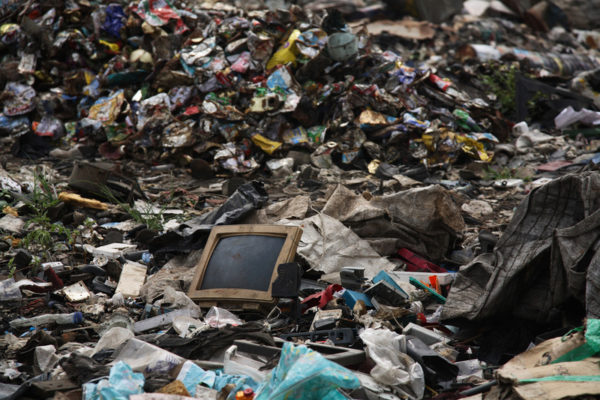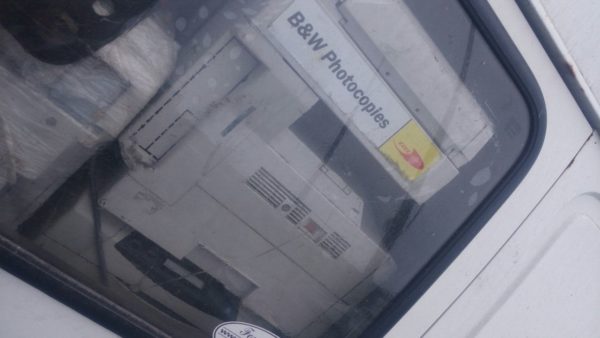Photocopiers, fridges and flat screen TVs: how second-hand cars are being used to smuggle toxic e-waste
Around 41,500 tonnes of second-hand electronics were shipped inside used vehicles to Nigeria in 2016, according to a new study

The UK and other European countries are failing to stop toxic e-waste such as flat-screen TVs and refrigerators from being smuggled inside used cars and dumped in Nigeria, according to new research.
Around 41,500 tonnes of used electronic items were shipped inside cars, buses and trucks into Lagos from the EU and US in 2016, it estimates.
Goods are largely being imported by informal networks based in Nigeria, but waste disposal companies could also be involved, the researchers said.
Almost a quarter was exported from the UK, with only Germany responsible for more. Only 2% came from the US.
The report conducted by the United Nations university and the Basel Convention Co-ordination Centre (BCCC) “exposes a very serious loophole in enforcement” on behalf of exporters for the first time, a co-author told Unearthed.
As a result, it is not known how widely this method of import is being used, but the UN has been exposing the stream of toxic e-waste in recent years. Nigeria and Ghana are known hubs of entry. A British environmental company was linked to the underground waste trade in 2011.
“Most unexpected”
The researchers said that the discovery of so much old office equipment and household appliances being shipped in this way was “most unexpected”. They carried out inspections on used vehicles at ports in Lagos and found that more than half (55%) contained second-hand electronic goods.
Items found also included photocopiers, smart phones, desktop computers and laptops, kettles, irons, air conditioners, power generators, microwave ovens, washing machines and electric cookers.
Not all of the items discovered were shipped illegally. Some will be re-used, refurbished or stripped apart for valuable components or metals. However large quantities of old electronics end up in open dump sites, which can be dangerous to human health, the environment and are often accessible to children.
International law under the Basel Convention governs the shipment of used electronic goods using a number of factors to define legality, including functionality, hazardous components, whether there is a market for the goods and if they are intended for re-use, disposal or recycling. Air conditioners and refrigerators can contain toxic HCFCs while LCD-TVs can sometimes contain mercury.
Most of the items found inside used vehicles were not declared in paperwork.
Co-author of the report Dr. Otmar Deubzer from the UN university told Unearthed: “This exposes a very serious loophole in enforcement. Shipments pass through customs but they are not being inspected properly when exported.”
The European Union Network for the Implementation and Enforcement of Environmental Law (IMPEL), a umbrella body for environmental regulators across Europe told Unearthed that the report’s findings were in line with their own work on the subject and that European countries have been carrying out inspections on waste shipments since 2006. Around a third were found to be illegal, included those stored in used vehicles.
A spokesperson said: “The main challenges faced by the law enforcement authorities include monitoring consignments of mixed goods, wrong declarations and false paperwork. Testing equipment and opening vehicles that are often sealed off, for inspection purposes, put high demands on the already limited resources of the authorities. The definition of waste and classification of electronic and electric equipment also continues to generate different views and interpretations among authorities and member states.
“Cooperation with police, customs and prosecutors will be further intensified. Operational communication with the receiving countries of waste is key; also in order to deal with the repatriation of illegally shipped waste.”
Prof. Percy Onianwa, executive director of BCCC Africa told Unearthed: “It was most unexpected to find these used items being exported inside cars. In many cases, if these goods are not wanted they end up being disposed of in a way that is environmentally unsound or dangerous. Plastics get burned, which creates pollution. They get dumped in open dump sites that children can access or in shallow streams in the middle of cities.”

The European Environmental Bureau told Unearthed that more pressure should be put on producers to pay for treatment of waste through re-use or recycling.
“More enforcement is needed at EU level to fight illegal shipments and more rules are needed to ensure the producer responsibility principle is applied”, said Mauro Anastacio, a spokesperson from the European Environmental Bureau (EEB).
The researchers have informed the Nigerian government of their findings and are helping to set up a working group on the issue of e-waste.
The project was funded in part by the US Environmental Protection Agency and the German economic development ministry.
The Nigerian enforcement agency, HMRC and UK Environment Agency are yet to respond to requests for comment.

